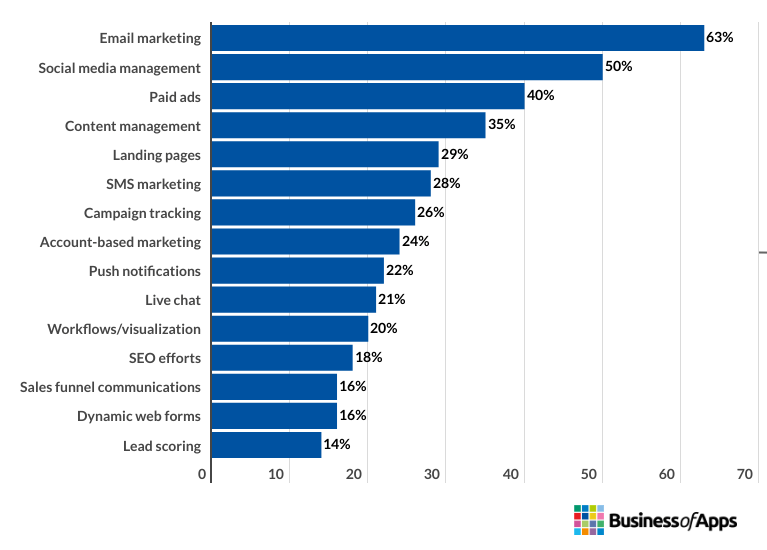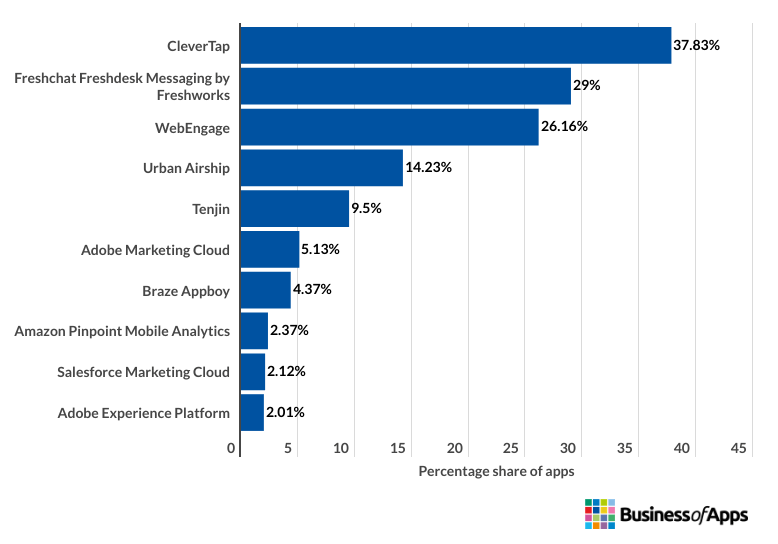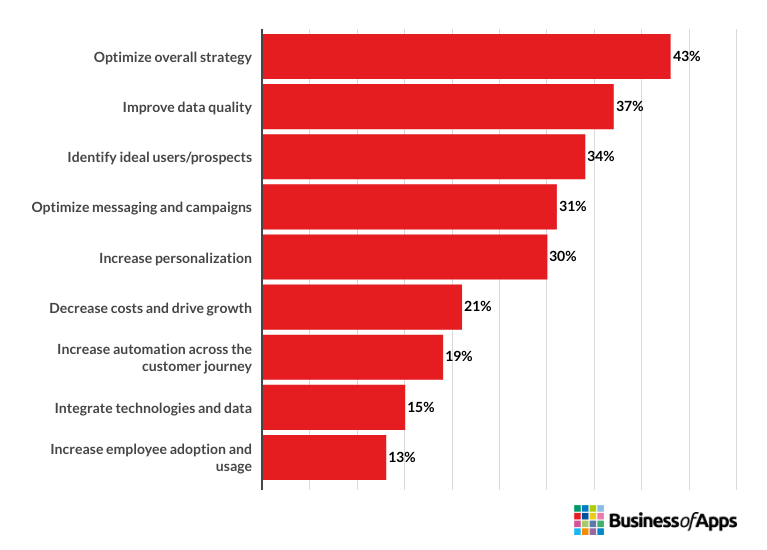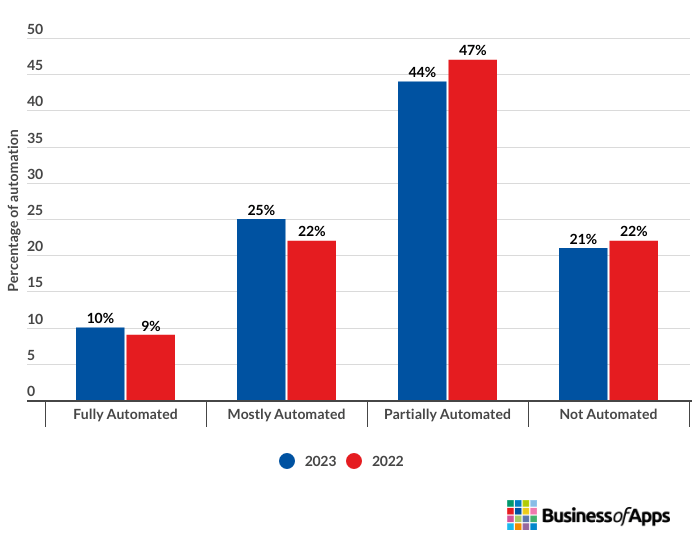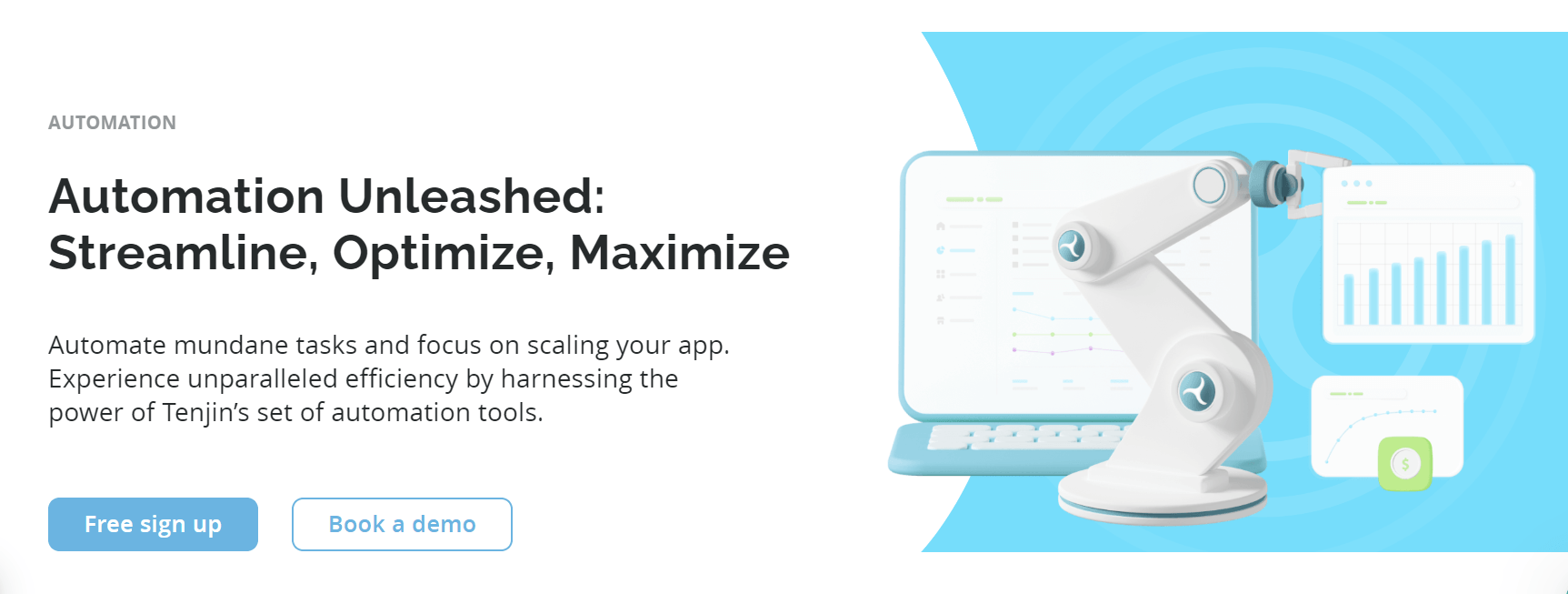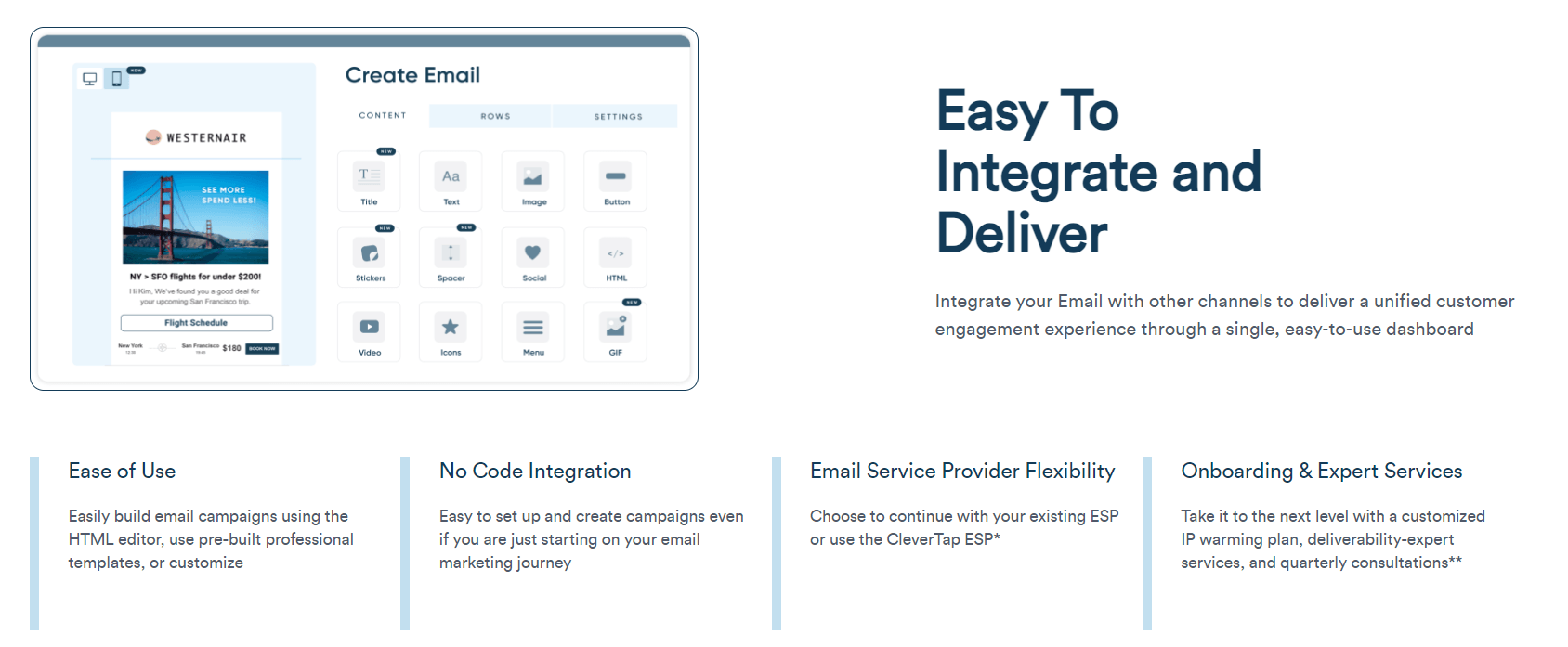Marketers should create accurate estimates of their marketing automation costs to build successful and profitable campaigns. And deciding which route to take–via automation software or through an agency–is a critical part of lowering automation pricing.
Current reports show the global market value of automation tech revenue will grow from 11.4 billion U.S. dollars in 2017 to 25.1 billion in 2023. And businesses and apps of all sizes can capitalize on this growth by finding support that can help lower their marketing automation cost.
Whether you go through the platform or agency pathway, a low marketing automation cost will generate better ROI. Plus, marketing automation offers a convenient way to improve campaigns with regular, automated monitoring and analysis. And with a more informed approach to lead generation, engagement, and higher retention rates, marketers can improve business outcomes across a variety of touchpoints ranging from SMS to CRM, push notifications to content cards.
Featured Mobile Marketing Automation Platforms
| ASTRAD | More than an Ad Delivery Partner | View more |
A better understanding of your marketing automation cost will support better campaign delivery. And to help with reviewing key areas to focus your strategy on, this research guide aims to share data, insights, and research that will support any marketing automation pricing forecasts.
Key Data Points
- The global market value of automation tech revenue will grow from 11.4 billion U.S. dollars in 2017 to 25.1 billion in 2023. (Statista)
- In 2023, 63% of all email marketing used some form of automation in their marketing efforts. (Statista)
- 59% of marketers believe email is twice as effective at generating leads compared to PPC and paid social. (Marketing Tech News)
- Advanced push notification targeting can improve reaction rates by 300% while personalization can boost reactions by 400%.
- Content Cards can boost loyalty and enrollment conversions by 5X.
- 48% of marketers say automation strengthens their relationship with customers (Woopra)
- Marketing automation software pricing can start from around $75 pcm (CleverTap) and rise to a range of $1,500 – 2,000 pcm (WebEngage).
- Marketing automation returns $5.22 against each dollar spent. (Nucleus Research)
- General app marketing agency costs can reach up to $25k per app.
Defining mobile marketing automation
Mobile marketing automation refers to the software, tech systems, and tools that automate marketing operations. It is a marketing technique that can free up marketers from the resource burden of manual campaigns while replicating the human touch as far as possible.
By gathering insights from current campaigns, it acts as a method to improve lead generation, user engagement, retention, and conversions. Various tech-based tools and software fall under the definition of marketing automation, including CRM, CEP, push notifications, SMS marketing, and data and analytics reporting tools.
Marketing automation was first referenced by the academic John D.C. Little in 2001. Since then, several scholars and practitioners have suggested different meanings, as technology has evolved.
More recently, Burka, K., & Kelly B. (2018) defined marketing automation as:
“technologies focusing on the definition, planning, segmentation and tracking of marketing campaigns, allowing the marketing and sales functions to cultivate leads with highly personalized content aimed at attracting and retaining customers”.
Features of marketing automation software
Setting up and running successful marketing campaigns is far less burdensome with marketing automation software tools at hand. And app businesses of all sizes can use them to engage or convert higher volumes of app users, prospects, and lapsed users.
Along with running different marketing touchpoints, automation software also includes data analysis and tracking tools. Such tools can aid in analyzing marketing response rates and using data to design new marketing approaches or nurturing relationships through a sales funnel. Using a data-driven approach to create a strong feedback loop can help companies keep their marketing automation cost low.
A variety of marketing automation channels fall under the term ranging from social media management to SMS, Live Chat, and Content Management. App marketing can take a more specific approach. Some of the areas specific to mobile marketing automation include:
- Real-time engagement and automated triggers
- User segmentation and personalization
- A/B testing
- App integration
- Analytics
Examples of marketing channels that make use of automation, worldwide in 2023
Source: Statista
Email marketing
Email marketing is still a popular channel for most marketers to automate. In 2023, 63% of all email marketing used some form of automation as part of their marketing automation cost planning.
This stands to reason since a 2023 whitepaper by Sopro entitled ‘The State of Prospecting 2023’ revealed that 59% of marketers believe email is twice as effective at generating leads compared to PPC and paid social.
Email is also effective for retargeting e-commerce app users and establishing effective customer experience strategies and user journeys.
Push notifications
Automating push notifications can lead to improved reaction rates. For instance, our data shows how advanced targeting can improve reaction rates by 300% while personalization can boost reactions by 400%.
And many software platforms and agencies can help you bundle push notification elements together like in-app messaging, web push notifications, mobile push, and notifications to wearable devices. Including each one can help you factor costs into your automation pricing plan.
SMS/MMS
SMS marketing remains a growing but sometimes overlooked form of customer engagement marketing that aligns well with automation plans. By targeting mass volumes of users at high open rates of up to 98%, SMS marketing is an attractive channel for marketing automation.
Recent stats suggest over 70% of marketers recognize the incremental revenue SMS drives, making it a sensible option to include in marketing automation for subscription-based apps.
Social media management
Marketing automation can streamline much of the work involved in social media marketing. Scheduling tweets, managing posts, publishing videos, and A/B testing campaigns is much easier with marketing automation tools. And using automation to tackle social media updates is an important way to reduce any marketing automation cost.
Content Cards
Marketing automation is an effective tool for building better engagement and retention rates while helping users create more effective and entertaining content.
One way marketing automation helps is through the use of content cards. This contrasts with SMS as a type of direct, persistent messaging that integrates with app UX and functionality. Studies show Content Cards can boost loyalty and enrollment conversions by 5X. Easy to automate, they’re an effective approach for building brand loyalty and engagement.
Capturing and managing leads
Automation tools in marketing also help lift the load when it comes to securing user contact details through sign-up or subscription forms. Harvesting such information can bolster engagement strategies and foster closer relationships with users.
Statistics also back this up, with 48% of marketers saying automation strengthens their relationship with customers. And this is most likely through the frequency and regularity of communication these tools offer.
Data analysis and campaign monitoring
Marketing automation software usually includes data analysis and campaign monitoring tools. By automating regular reviews of campaign performance or reaction rates, automation software can produce data to feed future marketing campaigns and improve their success rate.
CRM Integration
Marketing automation tools should easily integrate with your CRM. Better integration makes it easier to leverage data and maximize communication strategies. It can also streamline workflows and nurture leads and prospects into users. CRM integration can also lead to more personalized interactions and data-driven decision-making that can inform better customer journeys.
How much does marketing automation cost?
Current marketing automation software pricing offers a considerable range. Prices vary between providers, based on many factors such as which specific service, features, functionality, and support they can offer.
We can suggest that marketing automation software pricing can start from around $75 pcm (CleverTap) and rise to a range of $1,500 – 2,000pcm (WebEngage). You may also have to pay an initial set-up fee on top of the monthly subscriptions.
Agency vs Software
In general, paying to use a software automation tool (SDK) or platform will cost less than going to an agency.
In previous articles, we’ve shown how general app marketing agency costs can reach up to $25k per app. So, app marketers should expect to pay something similar with the cost of automation software on top. Extra costs reflect a form of management fee, which means you’ll be paying the agency to run your campaigns for you.
Paying an agency a subscription price or retainer can be worth it to benefit from their wealth of expertise and experience in running automated mobile marketing campaigns. This in itself may be valuable, in particular for app marketers who lack the experience or resources to run sophisticated and effective campaigns.
You may want control over your own marketing automation, in which case a mobile SDK or automation software may be a better option.
Android top mobile app marketing automation SDKs 2023
Source: Statista
Various aspects will influence your decision to choose a mobile SDK or agency, with a summary highlighted below:
- Example features of a mobile SDK or automation platform: Push notification scheduling, data tracking and analytics, CRM integration, A/B testing, segmentation and personalization.
- Example features of a marketing automation agency: Reviewing automation processes and determining the best for ROI. Supporting the set-up of automation platforms. Creating bespoke dashboards that analyze data and performance. Also, designing solutions that fit campaigns, e.g. lead tracking, personalization.
What to consider when looking at marketing automation pricing
Getting a starting point on reviewing any potential marketing automation cost requires a period of reflection, assessment, and review. To keep costs low, app marketers should have clarity and certainty about which items they want to automate.
Most common goals for using marketing automation
Source: Ascend2
According to a report from Ascend2, the primary goals for marketers to use automation in 2023 are to optimize overall strategy, improve data quality, and identify ideal users or prospects. But, to get the best measure of potential marketing automation cost, businesses should review several aspects.
Lead generation & segmentation
Marketing automation platforms and agencies that support lead generation strategies can give you time back to use on improving your product, developing your strategy, or enhancing your user experience.
It can also help to improve audience targeting which can lead to higher-quality leads. And marketers should factor this ROI into any budget for marketing automation.
Cross-sell & upsell options
Marketing automation tools can help with cross-selling and upselling through data tracking. For instance, cross-selling is helpful when working with affiliate marketers or other third parties.
It’s also useful for upselling through personalization, using tailored messaging to increase engagement and retention. In a 2023 report on B2B marketing automation, Adobe highlights that 64% of leaders are engaging in person-specific deep data personalization across all or most channels. They also show how 73% of leaders use marketing automation to gain the appropriate data and insights they need to create effective personalization.
Retention strategies
When the average app loses 77% of DAUs in the first 3 days post-install, retention should be a high priority in any marketing automation cost analysis. Using automation to drive retargeting through emails, SMS, push, or content cards–for instance–can support better or higher retention rates.
Marketing ROI measurements
According to data from Nucleus Research, businesses can recover their initial investment cost into marketing automation in less than six months, on average. Their research also showed how marketing automation returns $5.22 against each dollar spent.
Marketing automation software can measure ROI for you. And with this knowledge to hand, it’s easier to use it to drive sales, increase efficiency, better engagement, and cost savings.
Efficient campaign creation
Marketing automation tools can help run integrated and effective customer journeys that include email marketing, paid ads, and SMS marketing. The Ascend2 report also highlights how a higher proportion of marketers run either full or partial automated customer journeys in 2023, compared to 2022.
Extent of marketing automation in customer journeys
Source: Ascend2
Easy integration
It’s critical for any automation software to integrate with existing software, including your CRM, content management, and pipeline management programs. Some platforms may be easier to integrate than others which may result in a lower marketing automation cost. Both agencies and platforms should be able to advise on the level of ease when it comes to integrating software.
Email campaigns
Email is the most popular form of marketing communication to run through automation software. While it’s likely that efficient email management and campaigns will be a strong feature of any automation platforms and software, marketers may want to prioritize a review of this feature if they intend to send high volumes of emails.
Marketing automation software pricing models
Most marketing automation SDKs or platforms offer a SaaS pricing model, i.e. Software-as-a-Service. This model provides the convenience of cloud-based software at the cost of a regular subscription – either monthly or annually.
And the market for SaaS products has been on a continuous incline for many years. Recent research shows global tech revenue for marketing automation has grown to more than twice its size in 2017.
Monthly subscription plan
It’s common for SaaS automation platforms to offer a monthly subscription plan based on a number of different tiers and associated price points.
For example, WebEngage offers three different pricing levels based on MAU numbers and certain features.
WebEngage Monthly Subscription Packages
| Package | MAUs | Price Per Month | Features |
|---|---|---|---|
| Solo | <10k | $199 | Basic Segmentation Basic Analytics Email Support 5 Journeys Engage across all channels Limited 3rd party integrations Live View Detailed user profiles |
| Band | <50k | $899 | Funnels Cohorts Rolling time-window based segments 10 active journeys Download reports |
| Choir | <100k | $1499 | User analysis by multiple dimensions Device data Segment analysis by multiple dimensions Schedule reports 20 active journeys |
| Orchestra | >100k | Custom | Uninstall Analytics Live view of a segment 100 active journeys Custom reports |
Source: WebEngage
Monthly subscription, per contact
Marketing automation software pricing that uses a per contact or per MAU model will still run as a cloud-based monthly subscription. Often, SaaS platforms offer full functionality but charge only for the number of contacts in a company’s database. Some may provide online calculators for a fast quote or quote on a case-by-case basis. This form of marketing automation cost sometimes works best for B2C companies needing to get higher volumes of prospects via email marketing campaigns.
Additional marketing automation costs
Each SaaS platform will have different sets of price points that impact marketing automation cost. Plus, there are often extra costs to consider like set-up costs or consulting fees.
This section outlines key areas to be mindful of that will incur extra automation pricing.
Onboarding & implementation
Many platforms and agencies charge an initial fee to get you onboard. Fees can include the cost of setting up reports and dashboards, migrating data, and any training your staff needs to run or manage the programs.
Support
Agencies and SDK platforms can provide regular updates, check-ins, and customer support. Support levels can vary – some vendors will offer 24/7 helplines or even a dedicated and specialized account manager. Support via email, SMS, Slack or WhatsApp is also possible with some vendors.
Add-ons
App marketers may need extra features to add to their monthly package. And while some monthly packages include add-ons or integrations, if they’re not included you may need to pay to add them on.
Examples of add-ons include segmentation analysis, data reporting, bespoke user journeys, or purchasing a separate UP address.
Additional consultations
Some app marketers and leaders may need extra consulting to support strategic direction or training in a new area. Many platforms can provide this in the form of live or recorded webinars and training programs. One-to-one consulting on automation tools or strategic direction is also possible from some providers.
Number of Contacts or MAUs
The volume of Monthly Active Users or contacts to manage will have a direct impact on marketing automation cost. With higher numbers comes more data handling, higher investment in security, and extensive management costs. As a result, higher contact numbers mean higher costs.
Third-party integrations
Unlike native integrations that connect to APIs, third-party integrations use a different software platform to fuse an API integration between two apps. And it’s for this reason that they’re sometimes called third-party APIs.
The benefit of third-party integrations is that they save time while reducing the risk of errors or burdens from any mishaps along the way.
Choosing the right marketing automation pricing plan
Having gained a better sense of the variables and factors that influence marketing automation cost, how can you use this information to find the best automation pricing plan for your needs?
Many of the world’s leading app marketing agencies and platforms can run automated marketing campaigns on your behalf. They offer marketing automation software pricing plans based on different features and the number of MAUs or contacts to manage.
Here we’ll give you an overview of the key features some offer.
Tenjin
Tenjin offers tools and training to marketers to help run campaigns, analyze data, and drive advertising revenue. For any paid installs tracked through the platform, Tenjin won’t charge for them.
Screenshot of Tenjin’s website
Source: Tenjin
They have a three-tier structure that grants access to various Tenjin products:
- Free: 2,000 free attributions every month, 24,000 free attributions every year, unlimited organic installs, ad spend, and revenue reporting PLUS 15 Tenjin products.
- All Inclusive: $300 per month for up to 20,000 attributions or $500 for up to 50,000 attributions with access to all Tenjin products.
- Enterprise: Annual marketing automation pricing based on individual quotes and access to all Tenjin products. These include customized growth strategy consulting, A/B testing, and integration support.
CleverTap
CleverTap is a leading customer engagement platform that offers the full suite of capabilities for marketing automation. It allows for the creation of many different types of automation campaigns based on customer lifecycles along with easy email integration when delivering omnichannel campaigns.
Screenshot of CleverTap’s website
Source: CleverTap
They offer two principle pricing plans – $75pcm for up to 5,000 MAUs or $250pcm for up to 20,000 MAUs. And both packages offer the same features:
- Automated messaging channels including push, SMS, Email, and webhooks
- Behavioural analytics and dashboards
- A/B testing and segmentation
- Data management
Airship
Airship is an agency that offers a mobile marketing automation platform for creating automated messaging campaigns. It lets users run campaigns at a sophisticated level by running automation at various stages of the customer lifecycle.
Screenshot of Airship’s website
Source: AirShip
Key features of Airship’s automation services includes:
- Sequential Messaging
- Customization
- Analytics dashboard
- Behavioral triggers
- Location Aware
- API Streaming
Airship offers three tiers to their automation pricing structure – App Experience Platform (AXP),
Mobile Data Hub, and Success Packages.
Their AXP Enterprise package is an agency approach for app brands that starts at $25k per year.
Final Thoughts
Marketing automation tools bring a long list of benefits to app marketers and business leaders. It’s a growth area that’s only set to keep growing with the onset of AI.
Choosing a platform or agency to work with is a critical decision to keep your marketing automation cost low. Gaining new leads and better-retained users relies on well-planned customer journeys that use automation at critical touchpoints. From email to SMS, to in-app messaging and content cards, marketers need the support of automation to save time and resources.
But there are extra benefits to choosing cost-effective automation pricing models. And these range from easier planning of marketing activity through data analysis to better cross-selling and upselling opportunities. Marketing automation is a key way to gather useful insights that can feed future campaign performance and determine success.
Apps of all sizes and stages have many choices for how to engage in marketing automation and maximize this area of growth. By reaching out to marketing automation companies, platforms, and agencies that fit well with their business needs, they can find success in automation that boosts marketing ROI and leads to more deliberate and intelligent marketing activity.


